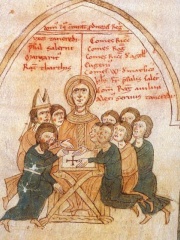 Brindisi
Brindisi
Brindisi ranks 2,139th in number of biographies on Pantheon, behind Carlisle, Tétouan, and Bangor, Maine. The most famous people from Brindisi are Roger de Flor, Lawrence of Brindisi, and Pacuvius. The most famous people who died in Brindisi are Virgil, and Tommaso Costantino. Brindisi has been the birth place of many writers, and military personnels and the death place of many writers, and athletes. Brindisi is located in Italy.
Brindisi is a city in the region of Apulia in southern Italy, the capital of the province of Brindisi, on the coast of the Adriatic Sea. Historically, the city has played an essential role in trade and culture due to its strategic position on the Italian Peninsula and its natural port on the Adriatic Sea. The city remains a major port for trade with the Balkan Peninsula, Greece and the Middle East. Its industries include agriculture, chemical works, and the generation of electricity. Read more on Wikipedia
People
Between 220 BC and 1982, Brindisi was the birth place of 7 globally memorable people, including Roger de Flor, Lawrence of Brindisi, and Pacuvius. Additionaly, 2 globally memorable people have passed away in Brindisi including Virgil, and Tommaso Costantino.
People Born in Brindisi
Go to all RankingsRoger de Flor
MILITARY PERSONNEL
1267 - 1305
HPI: 69.59
Rank: 1
Lawrence of Brindisi
RELIGIOUS FIGURE
1559 - 1619
HPI: 66.55
Rank: 2
Pacuvius
WRITER
220 BC - 130 BC
HPI: 64.78
Rank: 3
Eugenio Barba
WRITER
1936 - Present
HPI: 62.83
Rank: 4
Margaritus of Brindisi
POLITICIAN
1149 - 1197
HPI: 59.18
Rank: 5
Antonio Benarrivo
SOCCER PLAYER
1968 - Present
HPI: 53.93
Rank: 6
Flavia Pennetta
TENNIS PLAYER
1982 - Present
HPI: 53.76
Rank: 7
People Deceased in Brindisi
Go to all RankingsOccupations
Most individuals born in present day Brindisi were writers (2), military personnels (1), religious figures (1), politicians (1), and soccer players (1), while most who died were writers (1), and athletes (1).
Occupational Trends
Over the past 100 years, writers have been the top profession of globally memorable people born in Brindisi, including Eugenio Barba. Whereas, throughout history, writers have been the profession with the most memorable people born in present day Brindisi, including Pacuvius, and Eugenio Barba.
Places
Overlapping Lives
Below is a visual represetation of the lifespans of the top 0 globally memorable people born in Brindisi since 1700.









